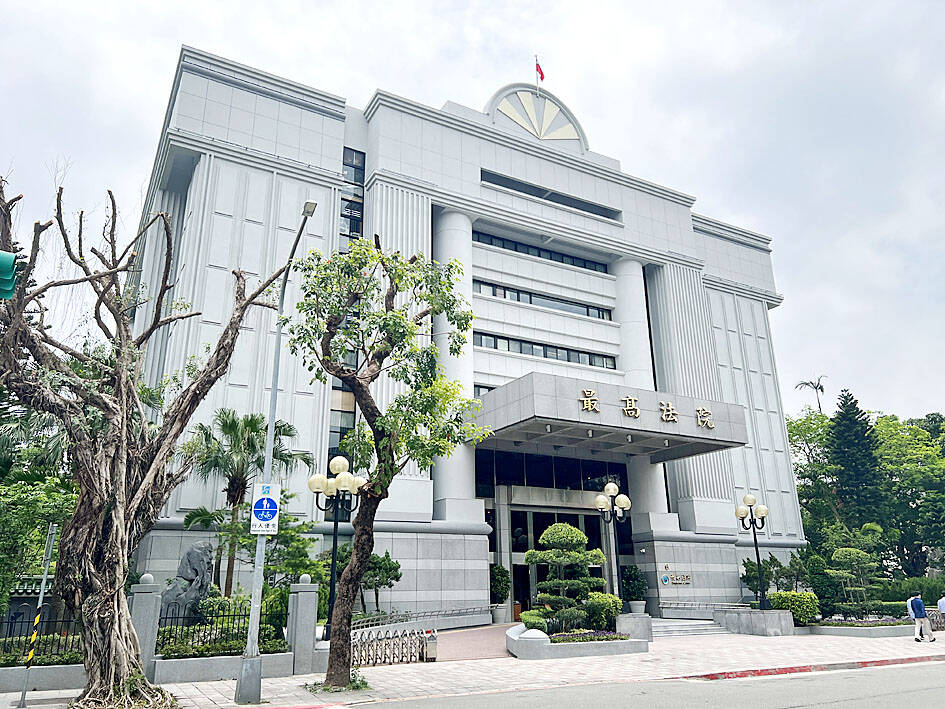People found guilty of causing minor injury or some drug-related offenses would no longer be entitled to appeal their case to the Supreme Court after a second trial following amendments passed by the legislature on Tuesday to address a judicial backlog.
The amendments to the Code of Criminal Procedure (刑事訴訟法) say that assault that inflicts bodily harm to another, as defined in the first paragraph of Article 277 of the Criminal Code, would not be appealable to the Supreme Court.
Furthermore, ingesting Category 1 drugs or possessing more than 20g of a Category 2 drug would also be unappealable after a second-instance judgement is issued, the amendments say.

Photo: Chang Wen-chuan, Taipei Times
With the changes, 10 types of criminal cases would not be heard by the Supreme Court, up from seven, which were larceny, embezzlement, fraud, breach of trust, extortion, receiving stolen property or an offense with a sentence of three years or less.
The revision is expected to decrease the number of criminal matters appealed to the Supreme Court to 500 to 600 per year, a judge who asked to remain anonymous told reporters by telephone on Wednesday.
A judge at the Supreme Court was responsible for an average of 13.6 cases per month in 2015, but in 2021 the average was 19.8, a 45 percent increase, the judge said.
As of April, the Supreme Court had 1,239 unresolved cases, 58 of which had been pending for more than a year, court data showed.
Trials for the three offenses that were affected by the amendments do not usually involve issues of application or interpretation of the law, the judge added.
For example, heroin identified in a urine test is a relatively straightforward issue to deal with, they said.
If judges at the Supreme Court are not given such cases, resources can be put to better use in more complicated cases, they added.

Taiwan has received more than US$70 million in royalties as of the end of last year from developing the F-16V jet as countries worldwide purchase or upgrade to this popular model, government and military officials said on Saturday. Taiwan funded the development of the F-16V jet and ended up the sole investor as other countries withdrew from the program. Now the F-16V is increasingly popular and countries must pay Taiwan a percentage in royalties when they purchase new F-16V aircraft or upgrade older F-16 models. The next five years are expected to be the peak for these royalties, with Taiwan potentially earning

POSITIVE DEVELOPMENT: Japan and the US are expected to hold in-depth discussions on Taiwan-related issues during the meeting next month, Japanese sources said The holding of a Japan-US leaders’ meeting ahead of US President Donald Trump’s visit to China is positive news for Taiwan, former Japan-Taiwan Exchange Association representative Hiroyasu Izumi said yesterday. After the Liberal Democratic Party’s landslide victory in Japan’s House of Representatives election, Japanese Prime Minister Sanae Takaichi is scheduled to visit the US next month, where she is to meet with Trump ahead of the US president’s planned visit to China from March 31 to April 2 for a meeting with Chinese President Xi Jinping (習近平). Japan and the US are expected to hold in-depth discussions on Taiwan-related issues during the

‘LIKE-MINDED PARTNER’: Tako van Popta said it would be inappropriate to delay signing the deal with Taiwan because of China, adding he would promote the issue Canadian senators have stressed Taiwan’s importance for international trade and expressed enthusiasm for ensuring the Taiwan-Canada trade cooperation framework agreement is implemented this year. Representative to Canada Harry Tseng (曾厚仁) in an interview with the Central News Agency (CNA) said he was increasingly uneasy about Ottawa’s delays in signing the agreement, especially as Ottawa has warmed toward Beijing. There are “no negotiations left. Not only [is it] initialed, we have three versions of the text ready: English, French and Mandarin,” Tseng said. “That tells you how close we are to the final signature.” Tseng said that he hoped Canadian Prime Minister Mark Carney

STAY IN YOUR LANE: As the US and Israel attack Iran, the ministry has warned China not to overstep by including Taiwanese citizens in its evacuation orders The Ministry of Foreign Affairs (MOFA) yesterday rebuked a statement by China’s embassy in Israel that it would evacuate Taiwanese holders of Chinese travel documents from Israel amid the latter’s escalating conflict with Iran. Tensions have risen across the Middle East in the wake of US and Israeli airstrikes on Iran beginning Saturday. China subsequently issued an evacuation notice for its citizens. In a news release, the Chinese embassy in Israel said holders of “Taiwan compatriot permits (台胞證)” issued to Taiwanese nationals by Chinese authorities for travel to China — could register for evacuation to Egypt. In Taipei, the ministry yesterday said Taiwan